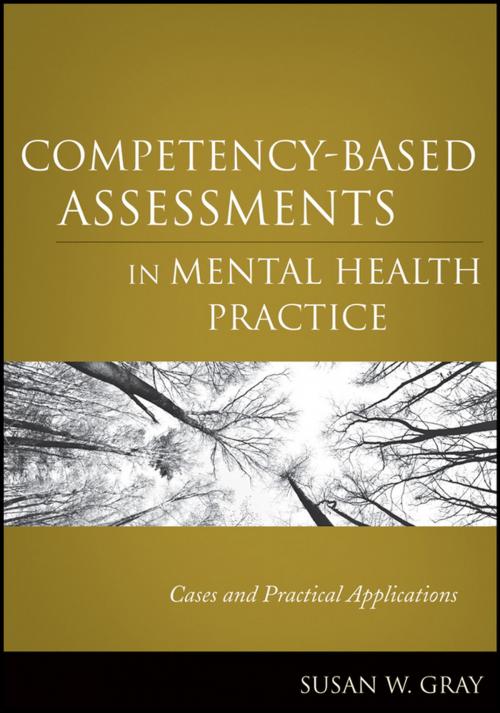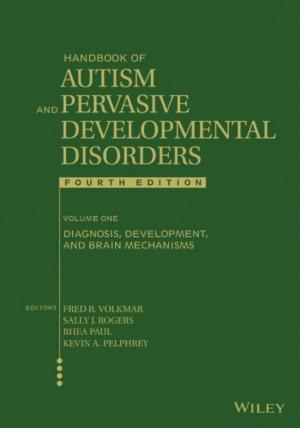Competency-Based Assessments in Mental Health Practice
Cases and Practical Applications
Nonfiction, Social & Cultural Studies, Political Science, Politics, Social Services & Welfare| Author: | Susan W. Gray | ISBN: | 9781118044223 |
| Publisher: | Wiley | Publication: | February 25, 2011 |
| Imprint: | Wiley | Language: | English |
| Author: | Susan W. Gray |
| ISBN: | 9781118044223 |
| Publisher: | Wiley |
| Publication: | February 25, 2011 |
| Imprint: | Wiley |
| Language: | English |
"Competency-Based Assessments in Mental Health Practice should be required reading for all clinical practitioners and students. Author Susan W. Gray provides a competency-based assessment model that moves away from looking at mental illness as a 'disease' to capturing people's strengths and the uniqueness of their experience with mental illness."
—Alex Gitterma
Zachs Professor and Director of PhD Program
"Competency-Based Assessment in Mental Health Practice not only describes the rather cumbersome DSM-IV-TR® in a manner that graduate students and clinicians can easily understand and apply, but it also presents a competency-based type of clinical assessment that most effectively integrates the social work practice orientation that acknowledges, appreciates, and nurtures client strengths, resilience, and client ability for empowerment."
—Agathi Glezakos, PhD, LCSW
School of Social Work
California State University, Long Beach
A competency-based assessment model integrating
DSM classifications for a complete, strengths-based diagnosis
Competency-Based Assessments in Mental Health Practice introduces a unique, competency-based assessment that presents a brief overview of the major mental disorders that practitioners will likely encounter in their work with clients, followed by a series of case studies and practical applications.
This book provides valuable guidance for clinicians to make assessments grounded in client strengths and possibilities for a more therapeutically complete picture of every client's "story."
Organized around selected diagnostic categories from the DSM-IV-TR, this hands-on guide offers a multidimensional look at the many factors that play a role in a client's life. Its holistic approach to the assessment process considers each client's unique experience with mental illness, through a concurrent evaluation of strengths and pathology, in order to set the stage for realistic optimism about the potential for change.
"Competency-Based Assessments in Mental Health Practice should be required reading for all clinical practitioners and students. Author Susan W. Gray provides a competency-based assessment model that moves away from looking at mental illness as a 'disease' to capturing people's strengths and the uniqueness of their experience with mental illness."
—Alex Gitterma
Zachs Professor and Director of PhD Program
"Competency-Based Assessment in Mental Health Practice not only describes the rather cumbersome DSM-IV-TR® in a manner that graduate students and clinicians can easily understand and apply, but it also presents a competency-based type of clinical assessment that most effectively integrates the social work practice orientation that acknowledges, appreciates, and nurtures client strengths, resilience, and client ability for empowerment."
—Agathi Glezakos, PhD, LCSW
School of Social Work
California State University, Long Beach
A competency-based assessment model integrating
DSM classifications for a complete, strengths-based diagnosis
Competency-Based Assessments in Mental Health Practice introduces a unique, competency-based assessment that presents a brief overview of the major mental disorders that practitioners will likely encounter in their work with clients, followed by a series of case studies and practical applications.
This book provides valuable guidance for clinicians to make assessments grounded in client strengths and possibilities for a more therapeutically complete picture of every client's "story."
Organized around selected diagnostic categories from the DSM-IV-TR, this hands-on guide offers a multidimensional look at the many factors that play a role in a client's life. Its holistic approach to the assessment process considers each client's unique experience with mental illness, through a concurrent evaluation of strengths and pathology, in order to set the stage for realistic optimism about the potential for change.















